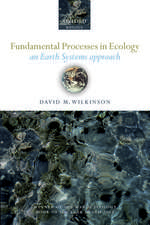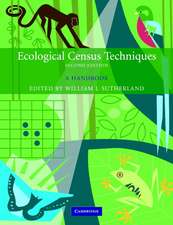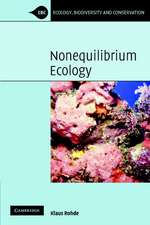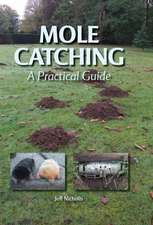The Trophic Cascade in Lakes: Cambridge Studies in Ecology
Editat de Stephen R. Carpenter, James F. Kitchellen Limba Engleză Paperback – 12 iul 1996
| Toate formatele și edițiile | Preț | Express |
|---|---|---|
| Paperback (1) | 386.54 lei 6-8 săpt. | |
| Cambridge University Press – 12 iul 1996 | 386.54 lei 6-8 săpt. | |
| Hardback (1) | 941.73 lei 6-8 săpt. | |
| Cambridge University Press – 18 aug 1993 | 941.73 lei 6-8 săpt. |
Din seria Cambridge Studies in Ecology
- 11%
 Preț: 424.68 lei
Preț: 424.68 lei - 11%
 Preț: 475.77 lei
Preț: 475.77 lei - 11%
 Preț: 658.08 lei
Preț: 658.08 lei -
 Preț: 419.10 lei
Preț: 419.10 lei -
 Preț: 373.85 lei
Preț: 373.85 lei -
 Preț: 377.12 lei
Preț: 377.12 lei - 11%
 Preț: 609.98 lei
Preț: 609.98 lei -
 Preț: 427.17 lei
Preț: 427.17 lei - 11%
 Preț: 510.21 lei
Preț: 510.21 lei - 11%
 Preț: 419.78 lei
Preț: 419.78 lei - 11%
 Preț: 618.78 lei
Preț: 618.78 lei -
 Preț: 413.31 lei
Preț: 413.31 lei - 11%
 Preț: 442.27 lei
Preț: 442.27 lei -
 Preț: 280.91 lei
Preț: 280.91 lei - 11%
 Preț: 497.07 lei
Preț: 497.07 lei - 11%
 Preț: 430.69 lei
Preț: 430.69 lei - 11%
 Preț: 571.23 lei
Preț: 571.23 lei -
 Preț: 291.17 lei
Preț: 291.17 lei - 11%
 Preț: 584.48 lei
Preț: 584.48 lei - 11%
 Preț: 468.03 lei
Preț: 468.03 lei - 11%
 Preț: 426.25 lei
Preț: 426.25 lei -
 Preț: 359.43 lei
Preț: 359.43 lei -
 Preț: 422.00 lei
Preț: 422.00 lei -
 Preț: 468.36 lei
Preț: 468.36 lei -
 Preț: 442.93 lei
Preț: 442.93 lei -
 Preț: 386.97 lei
Preț: 386.97 lei -
 Preț: 315.38 lei
Preț: 315.38 lei -
 Preț: 273.72 lei
Preț: 273.72 lei -
 Preț: 325.88 lei
Preț: 325.88 lei -
 Preț: 319.02 lei
Preț: 319.02 lei
Preț: 386.54 lei
Nou
Puncte Express: 580
Preț estimativ în valută:
73.96€ • 77.43$ • 61.20£
73.96€ • 77.43$ • 61.20£
Carte tipărită la comandă
Livrare economică 05-19 aprilie
Preluare comenzi: 021 569.72.76
Specificații
ISBN-13: 9780521566841
ISBN-10: 0521566843
Pagini: 400
Ilustrații: 115 b/w illus. 40 tables
Dimensiuni: 152 x 229 x 21 mm
Greutate: 0.56 kg
Ediția:Revised
Editura: Cambridge University Press
Colecția Cambridge University Press
Seria Cambridge Studies in Ecology
Locul publicării:Cambridge, United Kingdom
ISBN-10: 0521566843
Pagini: 400
Ilustrații: 115 b/w illus. 40 tables
Dimensiuni: 152 x 229 x 21 mm
Greutate: 0.56 kg
Ediția:Revised
Editura: Cambridge University Press
Colecția Cambridge University Press
Seria Cambridge Studies in Ecology
Locul publicării:Cambridge, United Kingdom
Cuprins
1. Cascading trophic interactions; 2. Experimental lakes, manipulations and measurements; 3. Statistical analysis of the ecosystem experiments; 4. The fish populations; 5. Fish behavioral and community responses to manipulation; 6. Roles of fish predation: piscivory and planktivory; 7. Dynamics of the phantom midge: implications for zooplankton; 8. Zooplankton community dynamics; 9. Effects of predators and food supply and diel vertical migration of Daphnia; 10. Zooplankton biomass and body size; 11. Phytoplankton community dynamics; 12. Metalimnetic phytoplankton; 13. Primary production and its interactions with nutrients and light transmission; 14. Heterotrophic microbial processes; 15. Annual fossil record of food-web manipulation; 16. Simulation models of the trophic cascade: predictions and evaluations; 17. Synthesis and new directions; Index.
Recenzii
"I found the book to be clearly written, and appropriate for its target audience, researchers in ecology and resource management...The breadth of approaches brought to bear in the study is extremely impressive...I recommend this book as a fine case history of a pluralistic approach to an important ecological issue." Tim Wootton, Ecology
"State-of-the-art theory and methods in a variety of ecological and aquatic disciplines are brought together and integrated. Many ecologists will be intrigued by the statistical approaches applied throughout the book...resource managers will find important and useful lessons about ecosystem management in practice." Brett Johnson, Fisheries Review
"This book is of interest to workers in ecology, aquatic ecology, resource management, and limnology." Environment International
"State-of-the-art theory and methods in a variety of ecological and aquatic disciplines are brought together and integrated. Many ecologists will be intrigued by the statistical approaches applied throughout the book...resource managers will find important and useful lessons about ecosystem management in practice." Brett Johnson, Fisheries Review
"This book is of interest to workers in ecology, aquatic ecology, resource management, and limnology." Environment International
Descriere
This 1993 book documents the importance of trophic cascades in aquatic ecology.















